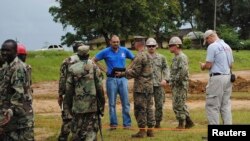While officials in the United States are struggling to cure two Ebola victims and contain any spread of the virus at home, U.S. military and USAID personnel in Monrovia, Liberia, say they are successfully completing facilities to help stop the virus at its source, without a single U.S. military infection.
About 500 U.S. soldiers, sailors, airmen and Marines are partnered up with USAID in Liberia and Senegal to try to stem the Ebola epidemic there. President Barack Obama has now authorized the Pentagon to order some military reserve units to active duty to help forces in West Africa.
“As long as you exercise basic sanitation and cleanliness protocols - using the chlorine wash on your hands and your feet, getting your temperature taken, limiting the exposure, no handshaking, those sorts of protocols - I think the risk is relatively low,” said Major General Darryl Williams, who heads U.S. military efforts against the Ebola outbreak there.
Williams said that throughout his time in West Africa, not one serviceman has shown any symptoms of the virus.
That policy coming from the U.S. Centers for Disease Control and Prevention has worked for USAID and the U.S. Embassy in Liberia, according to U.S. Ambassador Debra Malac.
“We have been following very carefully the CDC guidance and advice from Day 1, and to this point they are keeping us safe,” she said.
None of the U.S. servicemen are treating Ebola patients, and only a handful are in contact with specimens from people infected with the virus.
But the American undertaking is massive. Soldiers already have built a 25-bed hospital to care for local health care workers who contract the virus. Americans are building up to 17 Ebola treatment units and 65 community care centers.
They have two mobile labs in place, with four more on the way, and there are 56 teams providing access to safe burials of Ebola victims across Liberia.
But has that work begun to halt the spread of the virus?
“When looking at trends, you have to look at it over several epidemiological weeks, and we are constantly working to improve the surveillance on that data and monitoring any trends there,” said USAID representative Ben Hemingway.
In addition to the extreme sanitation requirements, officials say the mission has had other challenges. The rainy weather has slowed building in areas. Liberia is just 11 years removed from a devastating civil war that destroyed much of its infrastructure.
But one challenge Major General Williams does not expect is combat.
“This is a very permissive environment. Liberians like Americans and we’re liking Liberians. The Americans already here told us that, and so this is not Afghanistan or Iraq,” he said.
U.S. officials said the top priority is protecting Americans helping to fight the Ebola epidemic. The general said he feels “very comfortable” with the rules of engagement in place and approved by the government in Liberia.




